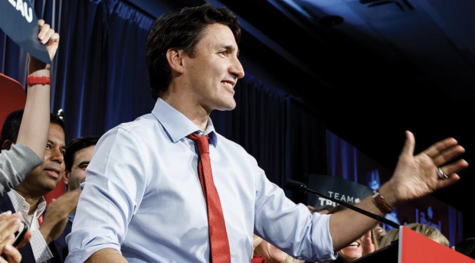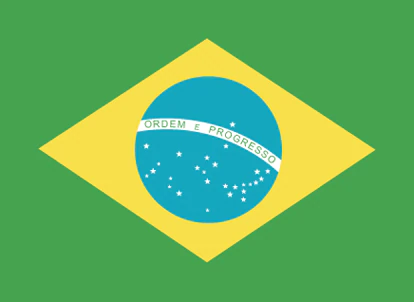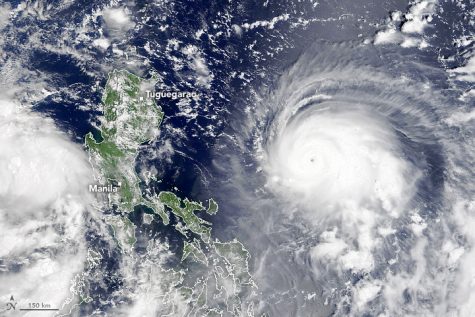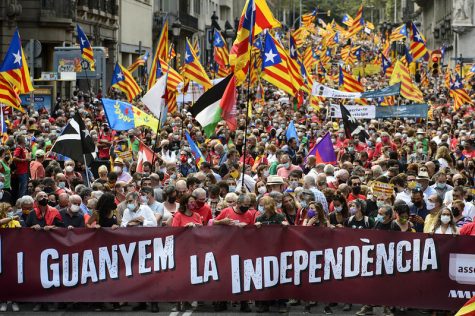Global Headlines (Issue 2)
September 30, 2021
Trudeau re-elected as Prime Minister in Canadian federal election

Canadian Prime Minister Justin Trudeau won in the federal election on Sept. 20, earning a victory for the Liberal Party, yet failed to secure the number of seats needed to win the majority vote. Trudeau, 49, is the son of former Prime Minister Pierre Trudeau and has served as Prime Minister since winning the election in 2015. The opposing Conservative Party, led by Erin O’Toole, consistently criticized liberal progress and succeeded in preventing a majority Liberal vote. The Liberal Party won 156 out of the 170 seats required to secure the majority, with the Conservatives winning 121, the New Democrats with 27, a gain of three seats, the Bloc Québécois with 32 seats and the Greens with two. During the COVID-19 pandemic, especially in recent months, the government spent over 500 billion dollars towards distributing vaccines and maintaining the economy during lockdown. He campaigned with goals of overcoming COVID-19 and distributing vaccines. Former U.S. President Barack Obama and former presidential candidate Hillary Clinton, both Democrats, supported Trudeau’s victory.
Brazilians protest against President Jair Bolsonaro and call for impeachment

Protests occurred throughout Brazilian cities on Sept. 12 as part of the impeachment push against President Jair Bolsonaro, who has faced widespread scrutiny for his mishandling of the COVID-19 pandemic. The government’s negligence led to widespread COVID-19 outbreaks and inflation in Brazil, drawing public criticism, and a March 2021 survey of 2080 voters across different sexes, age groups and educational levels show that 49% of surveyed voters disapproved of Bolsonaro’s administration. Lawmakers viewed Bosolnaro’s refusal to comply with the rulings of Justice Alexandre de Moraes of the Brazilian Supreme Court as unconstitutional. Despite the protests, Bolsonaro retains high chances of remaining in government. According to AP News, Bolsonaro’s supporters continue to attend rallies in high numbers, and recent protests lacked radical parties. The influential Workers Party, led by their President Luiz Inácio Lula da Silva, did not participate in the protests.
Typhoon Chanthu surges through Taiwan and eastern Asia

Typhoon Chanthu poured torrential rains on eastern Asia as it traveled through cities in Taiwan, China, South Korea, and Japan on Sept. 11, cancelling airplane, train, and boat trips. After briefly passing by Luzon, an island located in the Philippines, without causing damage, Chanthu traveled through Taiwan’s coast and left up to eight inches of rain. Cities on Taiwan’s east coast had already suspended flights and train services and evacuated its citizens. Shanghai also cut off its transportation as Chanthu approached; according to AP News, the Ningbo airport in China cancelled 41 flights, and officials issued warnings throughout the city.
Japan reaches 50% vaccination rate

The Japanese government reported that over 50% of the population of Japan received a form of the COVID-19 vaccine by Sept. 11, yet the government continues to extend its ongoing state of emergency in cities until Sept. 30. Japan began administering vaccines to the elderly in April, compared to early March in the United States. The country faced vaccine shortages at the time but have since then vaccinated half of its population. Prime Minister Yoshihide Suga pledged in an online message to distribute 60 million vaccines. In the meantime, restrictions are expected to be eased soon to allow vaccinated people to gather in larger groups and travel without quarantining. As of today, Portugal has the highest percent of population vaccinated of all countries, with a vaccination rate of 84.37%. The United States has a vaccination rate of 56.24%.
Catalan separatists rally against Spanish government

Thousands of Catalan separatists rallied against the Spanish government and clashed with police in Barcelona on Sept. 11 to advocate for Catalonia’s secession from Spain preceding talks on Sept. 15 between the Catalan and Spanish governments. Representatives of each government will meet for the first time since October 2017 to continue their negotiations of a bilateral commission on Aug. 3 that will primarily address Catalan demands regarding its sovereignty and economy. Talks will likely continue until February 2022. Separatists, who make up 52% of the Catalan population, unanimously believe that Spain benefits more than Catalonia in the two countries’ partnership yet have divided views over negotiations with Spain. Regional Catalonian president Pere Aragonès, who leads the Republic Left of Catalonia party, believes that negotiations are necessary to resolve disputes, while The National Catalan Assembly, the largest party which organized the rally, and Together for Catalonia are doubtful of whether talks with Spain will prove useful.


















![“[Building nerf blasters] became this outlet of creativity for me that hasn't been matched by anything else. The process [of] making a build complete to your desire is such a painstakingly difficult process, but I've had to learn from [the skills needed from] soldering to proper painting. There's so many different options for everything, if you think about it, it exists. The best part is [that] if it doesn't exist, you can build it yourself," Ishaan Parate said.](https://harkeraquila.com/wp-content/uploads/2022/08/DSC_8149-900x604.jpg)




![“When I came into high school, I was ready to be a follower. But DECA was a game changer for me. It helped me overcome my fear of public speaking, and it's played such a major role in who I've become today. To be able to successfully lead a chapter of 150 students, an officer team and be one of the upperclassmen I once really admired is something I'm [really] proud of,” Anvitha Tummala ('21) said.](https://harkeraquila.com/wp-content/uploads/2021/07/Screen-Shot-2021-07-25-at-9.50.05-AM-900x594.png)







![“I think getting up in the morning and having a sense of purpose [is exciting]. I think without a certain amount of drive, life is kind of obsolete and mundane, and I think having that every single day is what makes each day unique and kind of makes life exciting,” Neymika Jain (12) said.](https://harkeraquila.com/wp-content/uploads/2017/06/Screen-Shot-2017-06-03-at-4.54.16-PM.png)








![“My slogan is ‘slow feet, don’t eat, and I’m hungry.’ You need to run fast to get where you are–you aren't going to get those championships if you aren't fast,” Angel Cervantes (12) said. “I want to do well in school on my tests and in track and win championships for my team. I live by that, [and] I can do that anywhere: in the classroom or on the field.”](https://harkeraquila.com/wp-content/uploads/2018/06/DSC5146-900x601.jpg)
![“[Volleyball has] taught me how to fall correctly, and another thing it taught is that you don’t have to be the best at something to be good at it. If you just hit the ball in a smart way, then it still scores points and you’re good at it. You could be a background player and still make a much bigger impact on the team than you would think,” Anya Gert (’20) said.](https://harkeraquila.com/wp-content/uploads/2020/06/AnnaGert_JinTuan_HoHPhotoEdited-600x900.jpeg)

![“I'm not nearly there yet, but [my confidence has] definitely been getting better since I was pretty shy and timid coming into Harker my freshman year. I know that there's a lot of people that are really confident in what they do, and I really admire them. Everyone's so driven and that has really pushed me to kind of try to find my own place in high school and be more confident,” Alyssa Huang (’20) said.](https://harkeraquila.com/wp-content/uploads/2020/06/AlyssaHuang_EmilyChen_HoHPhoto-900x749.jpeg)










